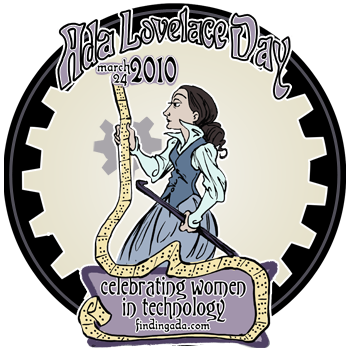Ada Lovelace Day | Fran Allen, IBM Fellow and A.M. Turing Award Winner
 For the second annual Ada Lovelace Day, March 24, 2010 - celebrating women in science and technology - I've chosen to write about Frances E. Allen, IBM Fellow, Turing Award winner and pioneer in the theory and practice of optimizing compilers. I've never had the pleasure of meeting her in person, but I'll take the liberty of calling her Fran, as Dick Merwin and everyone I know called her in their Fran stories.
For the second annual Ada Lovelace Day, March 24, 2010 - celebrating women in science and technology - I've chosen to write about Frances E. Allen, IBM Fellow, Turing Award winner and pioneer in the theory and practice of optimizing compilers. I've never had the pleasure of meeting her in person, but I'll take the liberty of calling her Fran, as Dick Merwin and everyone I know called her in their Fran stories.
According to her Wikipedia biography, Fran Allen grew up on a farm in update New York. After earning BSc and MSc degrees in Mathematics she joined IBM in July 1957, deeply in debt and planning to stay only until her school loans were paid. She stayed for a 45-year IBM career that included pioneering research and development in computer languages and compilers, leading her to become the first female IBM Fellow in 1989. She retired from IBM in 2002, won the Augusta Ada Lovelace Award that year from the Association for Women in Computing, and the A.M. Turing Award for 2006 (aka computing's Nobel Prize. Fran used the $100,000 Turing prize, funded by Intel, to start a fund to teach girls in areas of the world where educational opportunities are slim.
I first learned about Fran's work from Dick Merwin, then my boss at the Safeguard System Office, and former Engineering Manager of the IBM Stretch / Harvest computer. Stretch (aka the IBM 7030) was an extraordinarily ambitious and influential project to build the world's fastest computer; it was that - although it fell short of its 'stretch' goal of 100x faster than the IBM 704.
Very early in her career Fran played a crucial role in creating computer languages and compiler optimization techniques for the NSA's HARVEST system (which used Stretch technology) which Fran described in a Nov 2000 interview:
From abstract: " In response to government requests, IBM Research designed a system for a very large data processing application, known as the HARVEST system, including Stretch, which was delivered to the National Security Agency in the early 1960s. The combined Stretch-HARVEST Project created a milieu for developing new technologies, new hardware architectures, and new software to meet the challenges of both systems. One of the guiding principles of the project was to make programming easier by the use of a compiler to generate code automatically from statements in the user's language.
Allen was a member of the ALPHA language design team which created a very high level language featuring, among other things, the ability to create new alphabets beyond the system defined alphabets (e.g. English, decimal, integer, binary) and treat complex, heterogeneous data in high-level statements. In addition to an overview of Stretch-HARVEST, the talk will describe some of the lesser known aspects of the project the people and institutions involved, the political climate, and the shared knowledge, views, and value systems which were part of this interesting project at an interesting time in the history of computing. "Stretch HARVEST compiler lecture by Fran Allan | Film | Computer History Museum
And finally: "Allen, 74, thinks women were more prevalent when she started her career--in 1959, three of her four IBM co-managers were women--than they are today. The shortage of women in IT "is getting worse," she says." Fran Allen 2007 Information Week Interview.
Footnote: I tip my hat to IBM for its early leadership in fair, progressive employment and promotion policies that encouraged recruiting, recognition and promotion of highly qualified women, minorities and others who suffered from discrimination. It was was not only a morally right action, but also a business decision that brought exceptional talent to IBM to the lasting benefit of IBM stockholders.
Order shirts or mugs with the Ada Lovelace Day art (shown above) by Sidney Padua, author of The Thrilling Adventures of Lovelace and Babbage - a free Web comic you'll surely enjoy.
Via FindingAda.com here's a great Ada Lovelace Day 2010 presentation by Andra Keary
 I18N ERROR: @tsiskin#footer_RSS_Feed
I18N ERROR: @tsiskin#footer_RSS_Feed